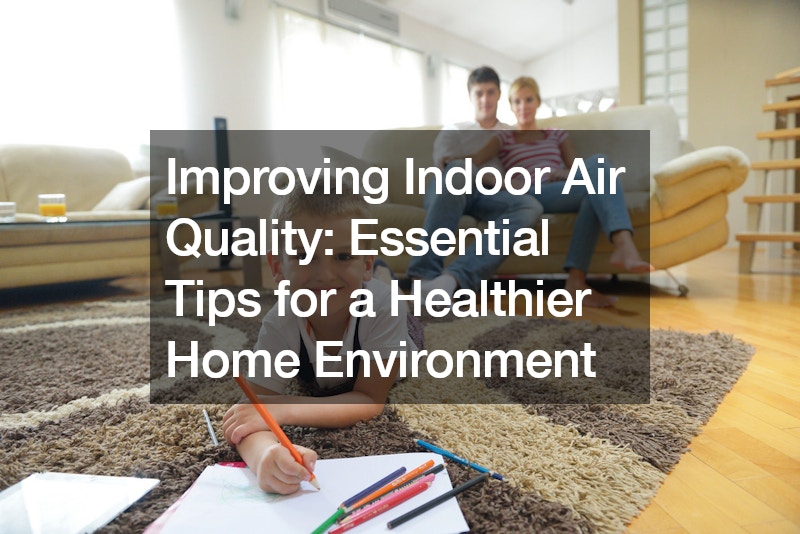In our modern lives, we often overlook the quality of the air we breathe indoors, despite spending the majority of our time within the confines of our homes. Yet, the air quality within our homes directly impacts our health and well-being in profound ways. From respiratory issues to allergies, the pollutants present in indoor air can significantly affect our daily lives. Fortunately, there are simple yet effective steps we can take to improve the air quality within our living spaces and create a healthier home environment.
One of the primary contributors to poor indoor air quality is the presence of mold and allergens. Common household allergens such as pollen, animal dander, and dust mites can trigger allergic reactions and exacerbate respiratory problems.
To combat these issues, it is essential to maintain a clean and hygienic living space. Regular cleaning routines, including dusting, vacuuming, and washing bedding, can help reduce the accumulation of allergens and prevent mold growth. Additionally, investing in high-quality air filters for HVAC systems can effectively trap airborne particles, improving overall air quality.
Particulate matter, such as dust and smoke, is another significant concern for indoor air quality. These microscopic particles can enter our homes through various means, including poor sealing and ventilation or tracked in by pets. According to the International Agency for Research on Cancer, airborne particulates are classified as a Group 1 carcinogen, highlighting the importance of addressing this issue. Simple measures such as proper sealing of windows and doors, along with regular ventilation, can help minimize the entry of particulate matter into our homes. Additionally, investing in air purifiers equipped with HEPA filters can effectively capture and remove airborne particles, further improving indoor air quality.
Maintaining optimal humidity levels within our homes is crucial for both comfort and health. While humidity may be a concern primarily in the summer months, it is essential to monitor and control humidity levels year-round. Excessive humidity can promote mold growth and lead to respiratory issues, while overly dry air can cause discomfort and exacerbate conditions such as dry skin and sinusitis. Installing a humidifier on your HVAC system can help maintain a healthy level of humidity throughout the year, ensuring optimal air quality and comfort within your home.
Gases such as volatile organic compounds (VOCs), carbon monoxide, and nitrogen dioxide pose serious health risks when present in indoor air. VOCs, emitted by household products and building materials, can cause headaches, nausea, and respiratory irritation. Carbon monoxide and nitrogen dioxide are particularly dangerous, as they can be fatal if present in high concentrations. To mitigate these risks, it is essential to ensure proper ventilation and regular maintenance of gas-powered appliances. Installing carbon monoxide detectors and conducting regular inspections can help detect and prevent potential gas leaks, safeguarding your family’s health and well-being.
Consider Consulting an Air Hygiene Specialist:
While implementing these measures can significantly improve indoor air quality, there are instances where specialized expertise may be required to address specific air quality issues effectively. This is where air hygiene specialists play a crucial role. These professionals possess the knowledge, experience, and specialized equipment necessary to conduct comprehensive assessments of indoor air quality and develop tailored strategies for improvement.
Air hygiene specialists can conduct thorough air quality testing to identify specific pollutants present in your home. By analyzing air samples, they can pinpoint the sources of contamination and assess the severity of the problem. Armed with this information, air hygiene specialists can then recommend targeted solutions to address the underlying issues and improve indoor air quality.
Additionally, air hygiene specialists can provide valuable guidance on preventive measures to maintain optimal air quality in the long term. From recommending the appropriate HVAC filters to advising on proper ventilation practices, their expertise can help homeowners create healthier living environments for themselves and their families.
Furthermore, air hygiene specialists can offer specialized services such as HVAC system cleaning and maintenance. Over time, dust, mold, and other contaminants can accumulate within HVAC ducts and components, compromising air quality and efficiency. By utilizing advanced cleaning techniques and equipment, air hygiene specialists can remove these contaminants and ensure that your HVAC system operates at peak performance.
In conclusion, while there are many steps homeowners can take to improve indoor air quality on their own, seeking the expertise of air hygiene specialists can provide additional benefits. From identifying specific pollutants to recommending targeted solutions and providing specialized services, air hygiene specialists play a vital role in helping homeowners create healthier home environments. By working together with these professionals, homeowners can ensure that their indoor air is clean, safe, and conducive to optimal health and well-being.
.


